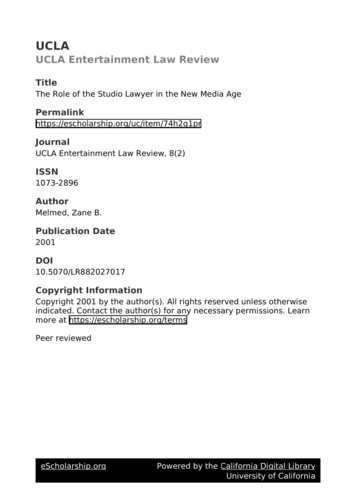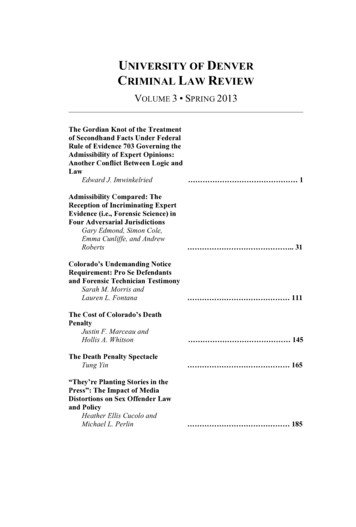
Transcription
UCLAUCLA Entertainment Law ReviewTitleThe Role of the Studio Lawyer in the New Media 1prJournalUCLA Entertainment Law Review, 8(2)ISSN1073-2896AuthorMelmed, Zane B.Publication Date2001DOI10.5070/LR882027017Copyright InformationCopyright 2001 by the author(s). All rights reserved unless otherwiseindicated. Contact the author(s) for any necessary permissions. Learnmore at https://escholarship.org/termsPeer reviewedeScholarship.orgPowered by the California Digital LibraryUniversity of California
THE ROLE OF THE STUDIO LAWYER IN THE NEWMEDIA AGEZane B. Melmed*I.INTRODUCTIONThe Internet is the fastest-growing mass medium in history-surpassing the worldwide expansion of broadcast television, radio, cabletelevision, and the telephone.' More than one billion people worldwidewill be online in less than five years-with more than 75 percent ofthose users living outside North America. 2 Already, English is the minority language online, and digital trade is quickly becoming a drivingforce of the global gross domestic product.3 The entertainment industry is making major footprints in this potentially lucrative space; entertainment studios partner with technology companies every day tocreate new media growth opportunities in areas such as digital music,interactive television and broadband network applications, includingdistribution of films on the Internet.The in-house entertainment studio lawyer who deals with new media issues (the "Studio Lawyer") is not an in-house entertainment lawyer in the job's traditional sense. The vocation does not simply entail*J.D. Candidate, University of California at Los Angeles School of Law, 2002; B.A.University of California at Berkeley, 1999.1 Press Release, Worldwide AOL Membership Surpasses Landmark 30 MillionMilestone, June 25, 2001 n?releasenum 55252019 .2 Stephen M. Case, Remarks for CNN World Report Dinner, May 31, 2001 case053101 .html .3 Id.
170UCLA ENTERTAINMENT LAW REVIEW[Vol 8:2drafting contracts, letters of intent and long-form agreements for thestudio. Such responsibilities still exist, but in this rapidly expandingage of new media, qualified Studio Lawyers should expect and be prepared to participate in their department's entire corporate strategicplanning process.As the entertainment, technology and finance sectors of the mediaindustry are brought together by the Internet, one may find StudioLawyers as busy these days reading Daily Variety, Red Herring, andWall Street Journal as they are drafting agreements. As Robert J.Dowling, editor-in-chief and publisher of The Hollywood Reporter,writes: "Radical changes will eventually morph the media industry,and that shift is starting to show."4 The role of Studio Lawyers continues to be central in this major metamorphosis, and they will help pavethis revolutionary road that studios are taking.II.WHAT IS A NEW MEDIA DEPARTMENT?In the past six or seven years, most television, music and moviestudios created new media departments. New media departments formstrategic alliances between the studio and technology companies. Suchalliances provide a studio with the chance to distribute its branded information and entertainment copyrights on, for example, the Internetor via wireless or broadband network applications. In general, newmedia technology provides studios with much more expansive exploitation than more traditional outlets such as television and film. Forexample, America Online's ("AOL") 30 million subscribers are nowinstantly available viewers of promotional material for Time WarnerInc.'s ("Time Warner") films, television shows, music, magazines andother publishing brands; the 106 billion merger between the twocompanies closed on January 11, 2001.5Currently, new media departments at entertainment studios arerelatively small, typically including a business development team, anassigned Studio Lawyer, a technology expert, two or three managersChad Graham, New Media 'JustGetting Started,' THE HOLLYWOOD5, 2000, at A6.4REP.,July5 Press Release, America Online & Time Warner Complete Merger to CreateAOL Time Warner, Jan. 11, 2001 http://media.aoltimewarner.com/media/press view.cfrn?releasenum 50252141 .
2001]THE ROLE OF THE STUDIO LAWYERand some staff assistants. Such departments are rapidly expanding,however, in sync with the evolution and growth of new media. BeforeTime Warner's merger with AOL, the major entertainment company'sbusiness interests reflected those of traditional media markets. TimeWarner classified such business interests into the following areas: cable networks, consisting principally of interests in cable televisionprogramming; publishing, focusing mostly on magazine publishing,book publishing and direct marketing; music, with interests primarilyin recorded music and music publishing; filmed entertainment, whichincludes theatrical films, television production and television broadcasting; and cable, which consists principally of interests in cable television systems. 6 Breaking with standard media market strategy, in thefirst quarter of 2000, Time Warner added digital media to these business interests by creating a division to deal in Internet-related anddigital media.Most entertainment companies are moving fast to capitalize in thenew media space. With this expansion comes the convergence ofmajor companies like AOL and Time Warner. According to AOLTime Warner's Chairman Stephen Case: "If the last decade of the 20thCentury was about the Internet, then the first decade of the 21st Century will surely be about convergence-as lines between traditionalmedia blur.",7 To keep up with the world's first Internet-powered media and communications company, other tech-friendly entertainmentcompanies like Disney/ABC and Vivendi Universal will follow thelead of AOL Time Warner in the near future-merging with directoryand e-commerce leaders8 like Yahoo! after expanding their existingnew media departments.III.NEW MEDIA'S LEGAL DILEMMAS AND THE GENERAL ROLE OFTHE STuDIo LAWYERThe reality today is that new media will take the old media schema6Edward Adler, Time Warner Businesses Report Record Second Quarter Oper-ating Results, July 18, 2000, at 7 qtrearningsreleases/2QOO.pdf .7 Case, supra note 2.8 See, e.g. Beth Cox, Yahoo! Merger Rumors Rampant, Jan. 18, 2001, http://www.internetnews.com/ec-news/article/0,,4 563631,00.html .
172UCLA ENTERTAINMENT LAW REVIEW[Vol 8:2and either swallow and integrate it-or turn it upside down altogether.The Hollywood Reporter's Dowling explains that, "[n]o new mediahas ever cannibalized the old media. New media has only become apart of the new franchises." 9 Therefore, for AOL Time Warner, Disney/ABC and Vivendi Universal, it is a bonanza that will allow suchcompanies to better market their existing product. Such a bonanzawill not occur without legal issues arising from almost every aspect ofthe deal. This is why the Studio Lawyer needs to be present and participating at every level of a studio's alliance with a technology company, and why the Studio Lawyer's role is becoming even more important.When a technology-based company comes to a studio's new mediadepartment with hopes of forming a strategic alliance, most do notforesee the plethora of legal issues that arise from the combination ofinterests; the studio may not catch them all either. While the studiowants to create new revenue streams in the wireless, broadband andInternet markets on a global level, the Studio Lawyer must keep itsstudio's feet on the ground, to explore the often not-yet-written laws,unforeseeable lawsuits and present and foreseeable judicial roadblocksthat lie ahead. When every major record label in the United Statesbanded together to sue the once-underground-turned-mainstreamsong-swapping service called Napster, Studio Lawyers were madewell aware of the unanticipated legal implications to every new mediadeal. Such is the problem: when venturing into the realm of the unknown, no one is fully prepared to anticipate all of the possible legalimplications.On July 11, 2000, Michael Robertson, the founder of MP3.com,spoke before the United States Senate Judiciary Committee on the future of digital music. Regarding the ambiguous legal issues currentlylooming over the music industry, Robertson said: "Never before inhistory has there been such a fog surrounding what a consumer canlawfully do with their music." 10 MP3.com recently lost its copyright9 Graham, supra note 4.10 Michael Robertson, Chairman and Chief Executive Officer of MP3.com, Inc.statement on The Future of DigitalMusic: Is There an Upside to Downloading? Before the Senate Judiciary Committee United States Senate (July 11, 2000) http://www.senate.gov/-judiciary/7112000 mr.htm .
THE ROLE OF THE STUDIO LAWYER2001]battle with the Recording Industry Artists of America (RIAA). "I donot have the answers, but I do know the questions," Robertson continued. "Can I play my music over the Internet? Can I store my musicusing a music service provider without fear of shutdown? Can I streammy music to my cell phone? How about to my Palm Pilot? Where domy rights start, and where do they end? What do companies that Ineed to help me access these rights have to do so I know they are lawful companies to choose to help me?"11 Like the RIAA's battles withcompanies like Napster and MP3.com, movie and television studiosare certainly no exception to new media's shaky ground. Guild residuals, investment strategies, copyright issues and appropriate drafting arejust some of the many obstacles the Studio Lawyer must parry.IV.THE ROLE OF THE STuDIo LAWYERA.A Business ArchitectThe first-generation of new media studio executives were mostly"creative types," convincing their companies that creating compellingInternet content mattered.12 Those who have stepped in to fill theirshoes are primarily executives that come from a business background. 3 Why such a shift? One reason is that the new-sprung technology companies that studios' new media departments deal with havenot had years to assemble all of their professional advisers and strategic partners. 14 Whether technology companies like it or not, new media departments often serve as business consultant, investment banker,professional team assembler, manager, strategic power broker andeven corporate psychologist.15 Moreover, to ensure that the technologycompany works right for the studio, the Studio Lawyer must have, according to one lawyer, "a level of enthusiasm for the whole processand a fascination with the new technology equal to or greater than that11 Id.12Ann Donahue, Studio Execs Warm to New Media, DAILY VARIETY, Aug. 1,2000, at Al.13 Id.14 Christopher27, 2000, at S4.15 Id.J. Gulotta, et al., Are You a New Media Lawyer?, N.Y.L.J., Mar.
UCLA ENTERTAINMENT LAW REVIEW[Vol 8:2of the clients." 16 Studio Lawyers play an important role in constructingtheir studios' rapid evolution of technology, mobility of capital and theability of new entrants to respond to consumer preferences.Thus, the Studio Lawyer does not idly make contracts while business development makes the deal. The Studio Lawyer also acts as anadditional business consultant for the young technology companies.Without the Studio Lawyer's relative expertise, the all too typicalfresh-out-of-Harvard Business School types with the next multimilliondollar technology who are ready to make a soft launch next quarter,are usually either legally way in over their heads or underestimatingthe entertainment studio's expectations.For example, the technology company's plans may be simple, liketurning their Internet-based animation shorts into a television deal witha studio. On the other hand, the studio's new media department isthinking globally, seeking to establish an alliance with the companyfor the creation and distribution of multimedia content in all forms ofmedia-including television, websites, publishing, theatrical, consumer products/merchandising, home video, music and video games.Warrants and stock are on the studio's proposed term sheet as well. Inthis unmapped new media environment where almost no businessmodel is conventional, the Studio Lawyer must uncover legal avenuesthat will help combine the company's new technology with the studio's global visions.It is the Studio Lawyer's job to sit attentively and ask pressing legal questions to the company's representative or lawyer in meetingsbetween the company and the studio. Studio Lawyers must begin toponder some of the preliminary legal issues that could arise from aparticular deal. There are also many factors of which Studio Lawyersneed to be aware. For instance, new media departments are often reminded by their superiors within the studio to close deals; technologycompanies do not just stop at one studio to pitch their product; if astudio fails to seize upon a quality client, another studio may step in. Ifthere are too many negative issues, the Studio Lawyer's recommendation to business development will be to can the deal, despite qualityventure capitalists already invested or a product's probability of success (lawsuits notwithstanding).16Id.
2001]THE ROLE OF THE STUDIO LAWYERThe Studio Lawyer and new media's business development teammust intellectually question and dissect each product. In some instances, while business development is talking globally with the technology company executive, the Studio Lawyer wrestles with otherstudio department lawyers about inter-studio legal complexities andfuture legal issues.17B.The CorporateGuruThe Studio Lawyer must possess an extraordinarily expansive,keen comprehension of general business know-how and insight intothe radically changing paradigm for success in the new economy.'8 Asalluded to, the Internet is not technically an "industry" and the profileof the Internet entrepreneur revolves around his technological sophistication. 19 Therefore, business wisdom on the part of the Studio Lawyer is a must for successful alliances not only with the studio's newmedia clients, but also with new media's business development teamand even the studio in general.Business knowledge on the part of Studio Lawyers helps businessdevelopment in many ways. The two must work together to positiontheir respective studio and partnering technology company in the rightplace. Developing equity investment strategy and protecting the valueof their studio's underlying assets are just some of the many areaswhere broad legal and business knowledge is required of Studio Lawyers when dealing with these new technologies. Like new media counsel generally, Studio Lawyers must possess a "strong crossdisciplinary orientation within the law," coupled with a particularstrength in the areas of corporate finance, securities and copyright.20 IfSee IV. D. The Studio Lawyer Needs Superior Drafting Skills, infra p.179,for more information on the inter-studio legal complexities.18 "A 'new economy' company is one with a focus on products or services re17lated to the Internet, telecommunications, or other high-tech business enterprises. Anew economy company often is an emerging growth private company. An 'oldeconomy' company typically is a more mature public company that uses traditionalmethods of manufacturing, communications, and advertising." Jonathan M. Ocker &Gregory C. Schick, Employment Agreements for New Economy ChiefExecutives, 23L.A. LAW. 21, Oct. 2000, at nl.19 See Gulotta, supranote 14.20Id. at SlO.
UCLA ENTERTAINMENT LAW REVIEW[Vol 8:2business development wants to make a deal, Studio Lawyers in thecross-industry global arrangement must draft proposed term sheetsthat complement and guide the subtleties in the methods and trends ofa wide variety of industries and businesses.In addition, new media initiatives affect multiple divisions withinthe studio. For a studio to benefit, the new media department requiresa tactical and strategic approach from the entire studio. It is up to thenew media department to convince the other studio departments (andtheir lawyers) that for the studio to maintain a dominant position, acollaborative, proactive approach is necessary. The Studio Lawyer'srole here is to design proposed global term sheets that will benefitevery division within the studio. For example, a television departmentmay have more incentive to form an alliance with the aforementionedInternet-based animation company if the television department ispromised warrants to acquire a certain percentage of the Internet-basedcompany at a reduced share price upon the first-airing date of the television series. While such a term may seem basic, when it comes timeto draft the deal memo, there are competing interests that the StudioLawyer must consider, including the interests of other studio divisions21and the technology company as well.Since new media's landscape is so new, some transactional knowledge is often only attainable through related business experiences. Forexample, Clarissa Weirick, corporate counsel for Warner Bros. NewMedia, a subsidiary of AOL Time Warner ("WB New Media"),warned never to sign a confidentiality agreement with a new technology company if the studio has greater bargaining power in the deal.Weirick explains the reason: "Company A, a small technology company going bankrupt, may try to grab onto [AOL] Time Warner on itsway down. So many technology companies that [WB New Media]meets with share the same ideas or inventions. We only choose onepartner. So, Company A will say that when they met with [WB NewMedia], it shared a similar idea in a meeting to one that [WB NewMedia] is now developing with Company B. Company A will subsequently claim that [WB New Media] and Company B are now using21See TV. D. The Studio Lawyer Needs Superior Drafting Skills, infra, p.179,for more information on the inter-studio legal complexities.
2001]THE ROLE OF THE STUDIO LAWYERCompany A's expression as its own. ' ' 22 Despite gaining such insightthe hard way-through experience-WB New Media puts it to use toavoid frivolous lawsuits in the future.C.Foreseeingthe Unforeseeable to Create Industry StandardsNo one knows exactly what the Internet-or the business environment contained within it-will look like once it matures. There isno historic precedent from which to draw conclusions. The StudioLawyers responsible for drafting agreements that will apply and havepotentially significant financial consequences years from now, must,as one author states, "look ahead onto the horizon and creativelyimagine what is likely to develop in order to plan for it.",23 Yet, forecasting is only part of the Studio Lawyer's responsibility. In draftingthe unprecedented deals, Studio Lawyers are also creating new legalstandards. The Studio Lawyer is not alone in this daunting task. Highlevel corporate lawyers assist the Studio Lawyer when a deal comesclose to fruition.Suppose a technology company (the "Company") and a studio (the"Studio") seek to establish a relationship where the company providestime-shifted Internet viewing of the Studio's television content to consumers. Such an alliance raises a number of unprecedented and challenging legal questions for the Studio, including who controls thecopies created, preventing piracy, fulfilling obligations to guilds andavoiding conflicts with other license holders. Answering these pressing legal issues are fundamental in the Studio's decision on whether ornot to recommend its participation and potential investment in theCompany.Assume the Company develops proprietary software to enableInternet viewing in a controlled, protected fashion (e.g., passwordprotected single viewing within five days of airing), and intends tocapture and playback shows within each local market with advertisingintact. Without any industry standard to follow, the Studio will make itclear to the Company that it address rights issues head-on, only airingshows from which the Company receives studio, network and local af22Interview with Clarissa Weirick, Vice President and Corporate Counsel, War-ner Bros. New Media (Aug. 3, 2000).23Gulotta, supra note 14 at S10.
UCLA ENTERTAINMENT LAW REVIEW[Vol 8:2filiate clearances. The Studio will also insist that the Company employwhatever security standards are necessary to ensure protection of theStudio's intellectual property (e.g., 4C watermarking, 5C encryption).By agreeing to a license relationship, the Company will stand toavoid the legal issues that shut down iCrave TV, and which are nowpending against Record TV. The Company's partnering approach withthe industry will please the Studio, allowing the Studio to shape howthe service is developed and used, and reap what revenue streams willresult. By launching the venture, the Studio will obtain a substantialshare of the Company, contractually receiving warrants from theCompany to partially protect its position through subsequent financingrounds. Such an alliance will appeal to the Studio.However, if the product becomes hugely successful, the types oflegal issues that the Studio encounters down the road can negativelyaffect the Studio's decision to move forward with the deal. For instance, will problems with guild residuals arise? In other words, willsuch time-shifted viewing require the Studio to calculate participationowed to talent? While the guilds will demand a portion of these Internet revenues, the Studio will probably argue that such programming issimilar to pay-TV in 1965, where residuals were not required. Preexisting agreements between producers and the major guilds offer no answer to the residual question. Without any contractual language to thecontrary, this revenue issue will be endlessly negotiated, arbitrated andeventually litigated.Another cautionary step for the Studio revolves around the issue oftalent endorsements. First, will guilds consider the actors as inadvertently "endorsing" any products that surround the computer screenwhile the viewer watches the time-shifted programming on his computer? If the guilds make such an argument, the next question is, doesthe Studio need approval rights from such actors, or would a disclaimer from the Company to the consumer suffice? Again, thesequestions have yet to be answered. One argument the Studio canmake, however, is that actors on a computer screen are much like professional athletes competing in a stadium filled with product endorsements-such athletes do not endorse every product advertised. Whyshould actors and the computer screen be treated any differently?Conversely, talent will argue that unlike stadium advertisements that
THE ROLE OF THE STUDIO LAWYER2001]are often hundreds of feet away from athletes in a stadium, links to apornographic website, for instance, will be inches away from the actors on a computer screen for extended periods of time. Imageconscious television actors will not tolerate these unwarranted associations, regardless of a Company disclaimer.Perhaps the most pressing issue for the Studio is music rights because so much television programming today is music-intensive, andbecause it is unlikely that the Studio anticipated acquiring the Internetmusic rights to shows already aired. Will the Studio have to backtrackand find out which songs were in which episode and pay accordingly?Moreover, will the Studio have to acquire a synch license to use songsplayed during a time-shifted show? Before forming a strategic alliancewith the Company, the Studio will struggle to answer these questions.Overall, the Studio will confront more questions than answers. Legal issues will arise regardless of how many measures the Studio takesto prevent litigation. Moreover, the Studio may simply acknowledgethat the courts will sort out the winners and losers down the road, andthat it should go ahead with the deal regardless of potential legal action. The Studio's lawyer, of course, will need to draft the long-formagreement as carefully as possible.D.The Studio Lawyer Needs SuperiorDraftingSkillsBecause new media landscapes are evolving, Studio Lawyers arefinding that "there is not an established, or, in most cases, even an existing body of tried-and-tested agreements that apply and which can beused" to help such lawyers document the many deals being made.24The Studio Lawyer is required to construct and draft entirely new andeffective agreements from scratch. When Studio Lawyers from largeentertainment companies draft letters of intent that incorporate manyof their subsidiaries and affiliates (the "Divisions"), they need to undertake particular protocols in drafting such agreements.For example, suppose the Studio Lawyer is assigned to draft a letter of intent to a technology company (the "Tech Company") for thecreation and distribution of multimedia content between the TechCompany and the studio. The Studio Lawyer must undertake certain24Id. at SIO.
UCLA ENTERTAINMENT LAW REVIEW[Vol 8:2measures to ensure that all participating Divisions are pleased with theletter of intent's content. First, the Studio Lawyer should ask the Divisions for a sample of their typical agreements with clients. Suchagreements usually discuss the option to purchase, grant of rights, development, compensation, terms and approval rights. After insertingsuch terms into a draft of the overall letter of intent, the Studio Lawyerneeds to meet with each division's lawyers and business developmentteam to discuss their points of concern. Often, there are many concerns.For instance, one Division's interest may conflict with another Division's preference. Would television's right to enter into a multimedia development and license agreement with the Tech Company beexclusive? If so, would such an exclusive right exclude the Studio'swebsite from hosting and co-branding an area or a channel showcasingthe television's characters? When and how shall net revenues receivedfrom the sale of the show's merchandise be distributed among the Divisions? What about net revenues received from the Tech Company'spre-existing website? To whom, how much, and upon what deliverableevent will the Tech Company grant to the studio warrants to acquireequity in the Tech Company? Of critical importance, will the TechCompany think the Studio is trying to swallow up its content andcompany equity?Furthermore, the creative legal drafting skills required to makesuch an agreement preferable to all the parties' interests must equal thesuperb business knowledge needed in drafting the agreements themselves. Business development will not be around at every meeting toassist the Studio Lawyer in explaining to the parties why, for example,a Division's distribution fee may be less than desirable. The StudioLawyer herself may end up negotiating between the Divisions on behalf of business development. As mentioned, what Studio Lawyersreally need are coordinated efforts across Division lines. However,until the Divisions fully understand and embrace the new technology,it is the Studio Lawyer's role to bring such Divisions on-board, creatively and efficiently.It should be noted that some basic drafting issues are now includedin studios' standard new media letters of intent. However, similar todeciding whether to sign confidentiality agreements with a technology
THE ROLE OF THE STUDIO LAWYER2001]company, Studio Lawyers have learned how to draft some aspects of anew media contract the hard way. For example, the increasing receptivity of entertainment studios in embracing new media technologyprovides technology companies with a chance to increase their business' respectability in this uncertain market. Moreover, a technologycompany will gain enormous clout in the business world if they form astrategic alliance with a large studio. Therefore, most deals nowstipulate that such companies shall not make any public or soft announcements until both parties mutually agree to issue a joint pressrelease. While a technology company would love to announce to theworld that they have just agreed to form a strategic alliance with amajor studio, the studio does not want to appear imprudent when thecompany goes under or fails to receive its next round of financing.E.Knowing the IssuesAmongst some new media players, there is growing fear abouthow litigious the industry may become. 2 5 As Ian de Freitas, partner atPaisner & Co., states: "Some clients think the Internet is the WildWild West, where they can do anything, but it's the most regulatedarea of business because it's global and there are different regulationsall over the world."' 6 Knowing such regulations is yet another key tocreating successful alliances.For instance, licensing Internet rights for film distribution bringsall sorts of problematic issues to a studio's table. Currently, differentdistributors on a territory-by-territory basis ultimately handle mostdistribution rights. Each distributor then distributes the film within itsown country. There are complex restrictions on inadvertent distribution outside the limited territory. As entertainment lawyer SchuylerMoore foresees: "All of this suffers the fate of the stone ax underInternet distribution, because consumers in any part of the world canhook up to a server located anywhere else. Unless caution is used, alicensee of Zimbabwe rights could set up a server permitting worldwide access to the film." 27 Under this plausible scenario, who will be25See, e.g. Yinka Adegoke, Lawyers Sole Winners in Dot Com Litigation, NEWMEDIA AGE., Apr. 6, 2000, at 23.26Id.27Schuyler M. Moore, Release of Films on the Internet Gives Rise to Novel Le-
UCLA ENTERTAINMENT LAW REVIEW[Vol 8:2left with the Internet rights? If it is the studio, acting as licensor, willthe studio then be required to pay the licensee for revenues attributableto Internet access within the licensed territory? How will such revenues be sourced-within the territory, based on phone number prefixes? Or some sp
major companies like AOL and Time Warner. According to AOL Time Warner's Chairman Stephen Case: "If the last decade of the 20th Century was about the Internet, then the first decade of the 21st Cen-tury will surely be about convergence-as lines between traditional media blur.",7 To keep up with the world's first Internet-powered me-










